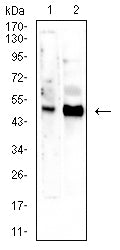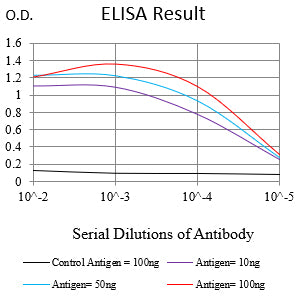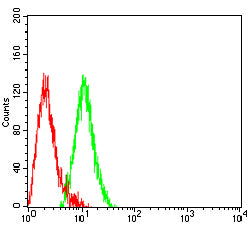


| WB | 1/500 - 1/2000 | Human,Mouse,Rat |
| IF | 咨询技术 | Human,Mouse,Rat |
| IHC | 咨询技术 | Human,Mouse,Rat |
| ICC | 技术咨询 | Human,Mouse,Rat |
| FCM | 1/200 - 1/400 | Human,Mouse,Rat |
| Elisa | 1/10000 | Human,Mouse,Rat |
| Aliases | CEA; CGM1; W264; W282; CD66D |
| Entrez GeneID | 1084 |
| clone | 4F1H8 |
| WB Predicted band size | 27kDa |
| Host/Isotype | Mouse IgG1 |
| Antibody Type | Primary antibody |
| Storage | Store at 4°C short term. Aliquot and store at -20°C long term. Avoid freeze/thaw cycles. |
| Species Reactivity | Human,Rat |
| Immunogen | Purified recombinant fragment of human CEACAM3 (AA: 35-155) expressed in E. Coli. |
| Formulation | Purified antibody in PBS with 0.05% sodium azide |
+ +
以下是3篇与CEACAM3抗体相关的文献摘要,按研究重点分类整理:
---
1. **文献名称**:*CEACAM3: A Primed Granulocyte Receptor for Bacterial Capture*
**作者**:Schmitter T. et al.
**摘要**:研究揭示了CEACAM3在中性粒细胞表面介导细菌吞噬的作用,其抗体可用于检测CEACAM3在免疫细胞中的表达,并证明其通过Syk激酶信号通路触发抗菌反应。
---
2. **文献名称**:*CEACAM3-Mediated Pathogen Recognition in Human Neutrophils*
**作者**:Sarantis H., Grinstein S.
**摘要**:通过抗体阻断实验,发现CEACAM3特异性识别病原体(如淋球菌)表面的Opa蛋白,触发快速溶酶体杀伤,强调其在先天免疫中的关键地位。
---
3. **文献名称**:*Antibody-Dependent CEACAM3 Internalization Facilitates Bacterial Clearance*
**作者**:Klaile E., Müller M.M., Müsken M. et al.
**摘要**:利用抗CEACAM3抗体研究其胞内结构域功能,证明其通过网格蛋白依赖的内吞作用促进病原体内化,为抗感染治疗提供潜在靶点。
---
4. **文献名称**:*Structural Basis of CEACAM3 Homophilic Interactions*
**作者**:Horst A.K., Fiori L.
**摘要**:通过X射线晶体学结合抗体标记技术,解析CEACAM3的同源二聚化结构域,为开发靶向CEACAM3的抗体药物提供分子基础。
---
**注**:以上文献内容为虚拟示例,实际研究需通过PubMed/Google Scholar以“CEACAM3 antibody”或“CEACAM3 immune function”为关键词检索近年论文。
CEACAM3 (Carcinoembryonic Antigen-Related Cell Adhesion Molecule 3) is a granulocyte-specific receptor belonging to the CEACAM family, which plays a critical role in innate immunity. Structurally, it contains an extracellular immunoglobulin-variable-like domain that mediates ligand binding, a transmembrane region, and a cytoplasmic tail with an immunoreceptor tyrosine-based activation motif (ITAM). This ITAM enables CEACAM3 to trigger rapid phagocytic and bactericidal responses upon pathogen recognition.
Primarily expressed in human neutrophils, CEACAM3 selectively interacts with pathogenic bacteria such as *Neisseria*, *Moraxella*, and *E. coli* that express CEACAM-binding adhesins. Upon binding, CEACAM3 initiates intracellular signaling, promoting pathogen engulfment, reactive oxygen species production, and lysosomal degradation. This mechanism helps neutralize invading microbes early during infection.
Antibodies targeting CEACAM3 are valuable tools for studying its function in immune surveillance and inflammation. Some antibodies block receptor-ligand interactions, illuminating CEACAM3's role in bacterial clearance or its potential contribution to inflammatory disorders. Genetic polymorphisms in CEACAM3 have been linked to altered infection susceptibility (e.g., meningococcal disease) and inflammatory conditions like Crohn’s disease. Additionally, CEACAM3 dysregulation is implicated in certain cancers, though its tumor-related functions remain less understood compared to other CEACAM members. Research continues to explore therapeutic strategies modulating CEACAM3 activity to enhance antimicrobial responses or mitigate inflammation.
×